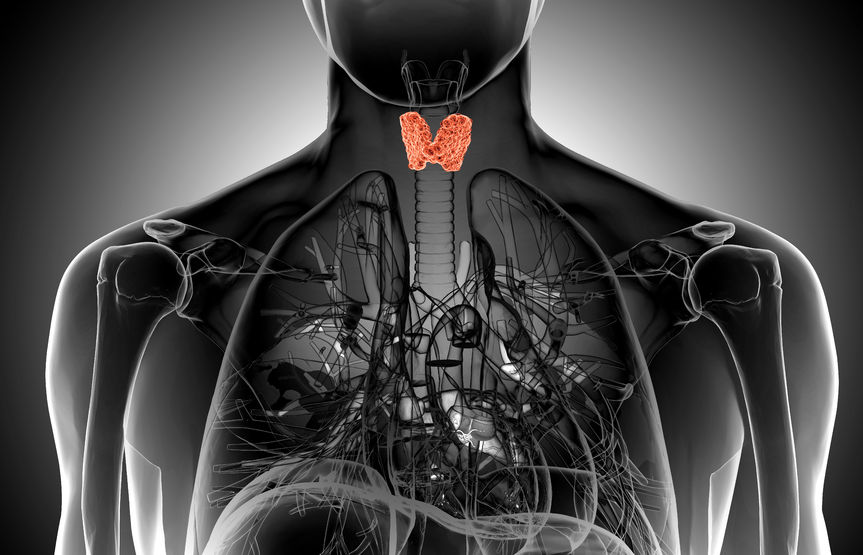
Your thyroid gland is a butterfly shaped gland that sits at the front of your neck, under the voice box. The function of your thyroid gland is important, affecting your metabolism in many different ways. Energy production, the ability to focus and concentrate, your skin, your hair, the ability to lose weight, your hormones; these are all systems of the body affected by the thyroid gland.
The thyroid gland is a small gland with so many functions. The thyroid gland releases a steady stream of thyroid hormones into the bloodstream. As the energy requirements of the body increase, the thyroid gland releases more thyroid hormone. It is the driver of metabolism.
T4 is the primary hormone produced by the Thyroid gland. It is the precursor to the metabolically active hormone, T3. The conversion of T4 to T3 occurs primarily in the liver and in other cells of the body. If the conversion of T4 to T3 is hindered, you may experience hypothyroid symptoms even though your TSH and T4 levels are “normal”. Therefore, measuring T3 levels is important when evaluating overall thyroid function.
What is Reverse T3?
Reverse T3 (RT3) is also a metabolite of T4. It is essentially an inactive form of T3. Reverse T3 can bind to the thyroid receptors in the cells of the body but does not have the same metabolic effect as T3. It essentially blocks the activity of T3 at the receptor level. It will compete for receptors at the cellular level. When less T3 binds to receptors, the body can start to experience hypothyroid symptoms (1)
For a full evaluation of thyroid hormone function, consider testing for Reverse T3. This will give information about the transport of T3. Elevated RT3 levels in the blood may indicated reduced transport into the cells. This has been termed “cellular hypothyroidism” (2)
The transport of thyroid hormone into the cell is important for efficient metabolism and energy production. This transport into the cell is energy dependant. Therefore, any condition that results in reduced energy production may affect the transport of T3 hormone into the cell and increased RT3 levels (2)
Reduced mitochondrial function is associated with reduced energy production. Therefor supporting mitochondrial energy production may improve the conversion of T4 to T3 and support thyroid function.
Conditions that may be associated with reduced T3, elevated Rt3 levels and subsequent decrease in optimal thyroid function include;
1. Stress
During times of stress the body’s metabolism may slow down. Some people find they gain weight during times of stress. Thyroid function may slow down during times of stress. This includes a decline in T3 (Triiodothyronine) , T4 (Thyroxine), reduced conversion of T4 to T3 may occur resulting in higher levels of Reverse T3 Healthline.com
2. Insulin resistance
In a study in the International Journal of Health Science Research, the researchers report Subclinical Hypothyroidism is associated with Insulin Resistance. Therefore, there is an increased risk of insulin resistance associated disorders such as metabolic syndrome and cardiovascular disease.
3. Chronic dieting with restricting calories
In a study published in the (International Journal of Obesity), 15 obese women were placed on a reduced calorie or very reduced calorie diet. Serum T3 levels decreased by as much as 66% in the group on the very low calorie diet and Reverse T3 increased by 27%.
4. Depression.
In a study published in the Journal of Thyroid Research, the most common abnormal thyroid hormone levels found in patients with depression include elevated T4 levels, low T3 levels, elevated RT3 levels, low TSH response to TRH and positive anti-thyroid antibodies.
Treating these conditions may help to reduce RT3 levels, increase T3 levels and improve the cellular transport of thyroid hormone into the cells. This may be a key part of treating Hypothyroid symptoms, especially when TSH and T4 levels are within normal range but the patient is experiencing symptoms.
At Vitalia Health Care in Vancouver we offer comprehensive thyroid testing that includes TSH, fT4, fT3, Reverse T3 and Thyroid Antibodies. Dr Tasreen Alibhai ND and Dr Elizabeth Miller ND are available for appointments to investigate your thyroid hormone levels and develop a personalized treatment plan customized for you.

